Dylan’s 'Neighborhood Bully' personified: The Israeli hostage deal & an original measure of intractable anti-Israel bias
Part I: Original surveys on antisemitism
On this, the annual International Holocaust Remembrance Day, it’s clear that people still remember the horrific genocide of 6 million Jews under the Nazis. But what’s also clear, sadly, is that more and more of us are remembering it the wrong way – blaming the Jews, at least in part, for the fate that befell them.
Over the seven years we’ve been surveying on this question, there’s been a four-fold increase in the share of respondents who say Jews were deserving or hold some responsibility for what happened to them in the Holocaust – from 4% in 2019 to 17% last October.
These findings provide a shocking backdrop to last week’s news, when Israel and Hamas announced a phased ceasefire deal in which Israeli hostages will be exchanged for Palestinian prisoners – many of whom are serving life sentences for major acts of terrorism. For every one civilian Israeli hostage released, Israel has agreed to turn over 30 Palestinian prisoners; for every one Israeli soldier released, Israel will return 50 Palestinian prisoners to Hamas.
Israelis are divided over whether this deal is good, bad, or some of both. Many feel the joy of seeing seven young women return home tempered by the recognition that hardened terrorists are being released from jail sentences, free to terrorize again.
To understand how American voters feel about this deal, we conducted a random sample survey of 1,000 Florida voters between January 17 and 24. The results demonstrate that while people are broadly sympathetic to the suffering of Israeli civilian hostages, as well as to the challenges their government faces to free them while securing the safety of others, there remains a seemingly intractable portion of people who can’t, or won’t, see anything Israel does as favorable — even when it strategically benefits Hamas.
Overall, 19% believe the deal is better for Israel, while 50% believe it’s better for Hamas and 31% think it’s equally fair for both sides. The “better for Israel” view is held by 28% of Democrats and 30% of those under the age of 45, while the “better for Hamas” view is expressed by 74% of Republicans and 56% of those over the age of 45.
That tells some of the story. But far more telling are responses to our next question, which was designed to be intentionally unreasonable so we could gauge the share of people who interpret all new information with an anti-Israel frame of mind.
We told respondents: “Israel will release 30 Palestinian prisoners, including convicted terrorists, in exchange for every 1 Israeli hostage, and will exchange 50 Palestinian prisoners for every 1 captive Israeli solider released.” We then asked them to identify which of two statements they agree with more:
A: Israel prioritizes its people and is willing to take significant risks, including the potential for more terrorism, to bring even 1 Israeli home.
B: Israel’s willingness to trade 1 Israeli for 50 Palestinians is unjust to Palestinians and reflects racism against Palestinians.
To reiterate, interpretation “B” was written to be intentionally unreasonable. There isn’t a rational explanation for how trading 1 Israeli for 50 Palestinians is somehow unjust to Palestinians. Even if it could imply that Israel considers the life of one of its people “worth” 50 of another, the act of making such an exchange isn’t racist — especially when it leaves Palestinians with a significant strategic advantage.
And yet, 23% of people chose option B: about 1 in 9 Republicans (11%), 1 in 5 nonpartisans (18%), and 2 in 5 Democrats (38%). Option B was also chosen by 38% of people under age 45, but just 18% of those older than that.
This, to me, is a clear demonstration of an “anti-Israel-no-matter-what” subset. It’s a measure of the “I’ll take ‘Israel can’t win even when it’s losing’ for $500, Alex” crowd. It’s Bob Dylan’s lyrics in Neighborhood Bully personified:
“Well, he knocked out a lynch mob, he was criticized
Old women condemned him, said he should apologize.
Then he destroyed a bomb factory, nobody was glad
The bombs were meant for him. He was supposed to feel bad
He’s the neighborhood bully”
Certainly Israel, like any nation engaged in warfare, is not beyond reproach. But where bias is so strong that one can’t concede even fair accolades about Israel when warranted — or worse, can’t avoid embracing a negative interpretation of Israel’s actions even in response to a patently absurd question — it’s hard to expect fair assessments of anything more complex.
These double standards and strong biases against Israel aren’t unique to the hostage deal.
For more than seven years, we’ve been conducting large-scale surveys tracking antisemitism, sentiment about Israel, and the Holocaust. These questions aren’t asked for any client, and have no agenda other than keeping an eye on an issue I care deeply about.
When Hamas attacked Israel on October 7, 2023, we were already sitting on data from more than a dozen surveys looking at these trends, and immediately went back into the field. Just after the attack, we asked respondents to what extent they believed Hamas was justified in its actions that day. A full 1 in 5 (20%) said they believed Hamas was at least somewhat justified. This spiked to 27% by April 2024, and drifted back down to 1 in 4 (25%) in October 2024 and again in this latest January 2025 survey.
The crosstabs reveal that, today, 34% of Democrats and 38% of those younger than 45 maintain that Hamas had some justification for murdering, taking hostage, and assaulting Israeli civilians.
In a follow-up column soon, I’ll detail more survey and experimental findings that give context to this harrowing statistic and outline a troubling and rising undercurrent — one that singles out American Jews and Israel in various ways, relating to self-defense, religion, diplomacy, and even genocide. That data will show that the modern face of American antisemitism includes all the usual suspects (white men carrying Nazi flags, chanting “Jews will not replace us”) but also a variety who live a lot closer to the mainstream. It’s a flavor of hate that’s a lot less comfortable to look at.
But for now, I’ll leave you with a final stat from the January 2025 survey — one that reflects great pessimism for how this particular ceasefire deal will play out, regardless of who it’s more “fair” for: Just 2% of people believe the deal will lead to the release of all hostages and result in a period of peace. Another 20% think hostages will be released but no peace will be found, and a strong majority, 65%, believe that while some additional hostages will be released, the deal will fall short. Finally, 13% are the most pessimistic, holding that no further hostages will be released at all, with no peace in sight.
For my part, I don’t know which side might ultimately benefit more from a 30:1 trade for all remaining Israeli hostages. But I sure hope we get to find out.


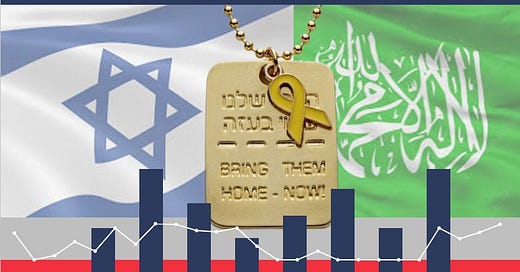



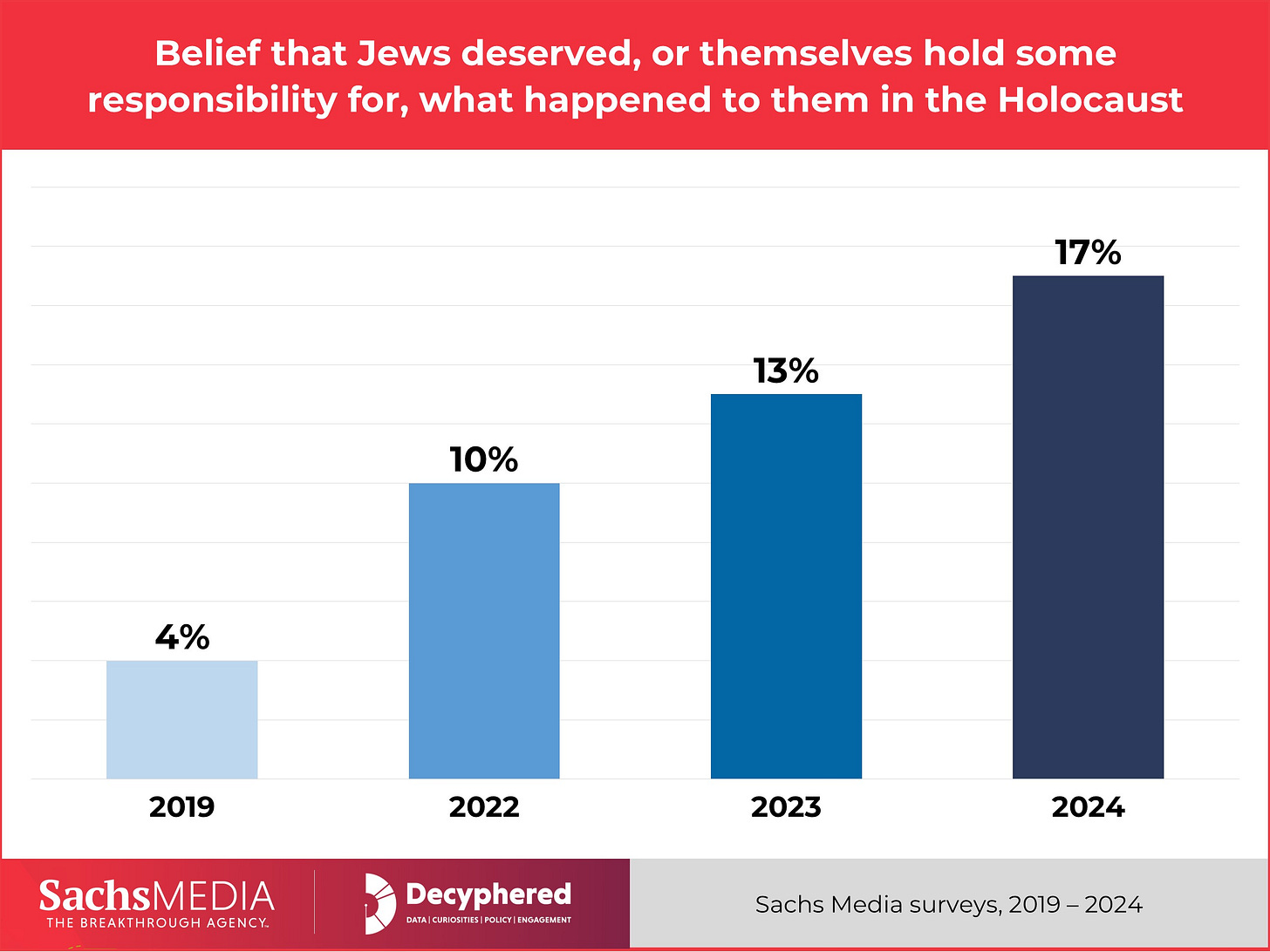
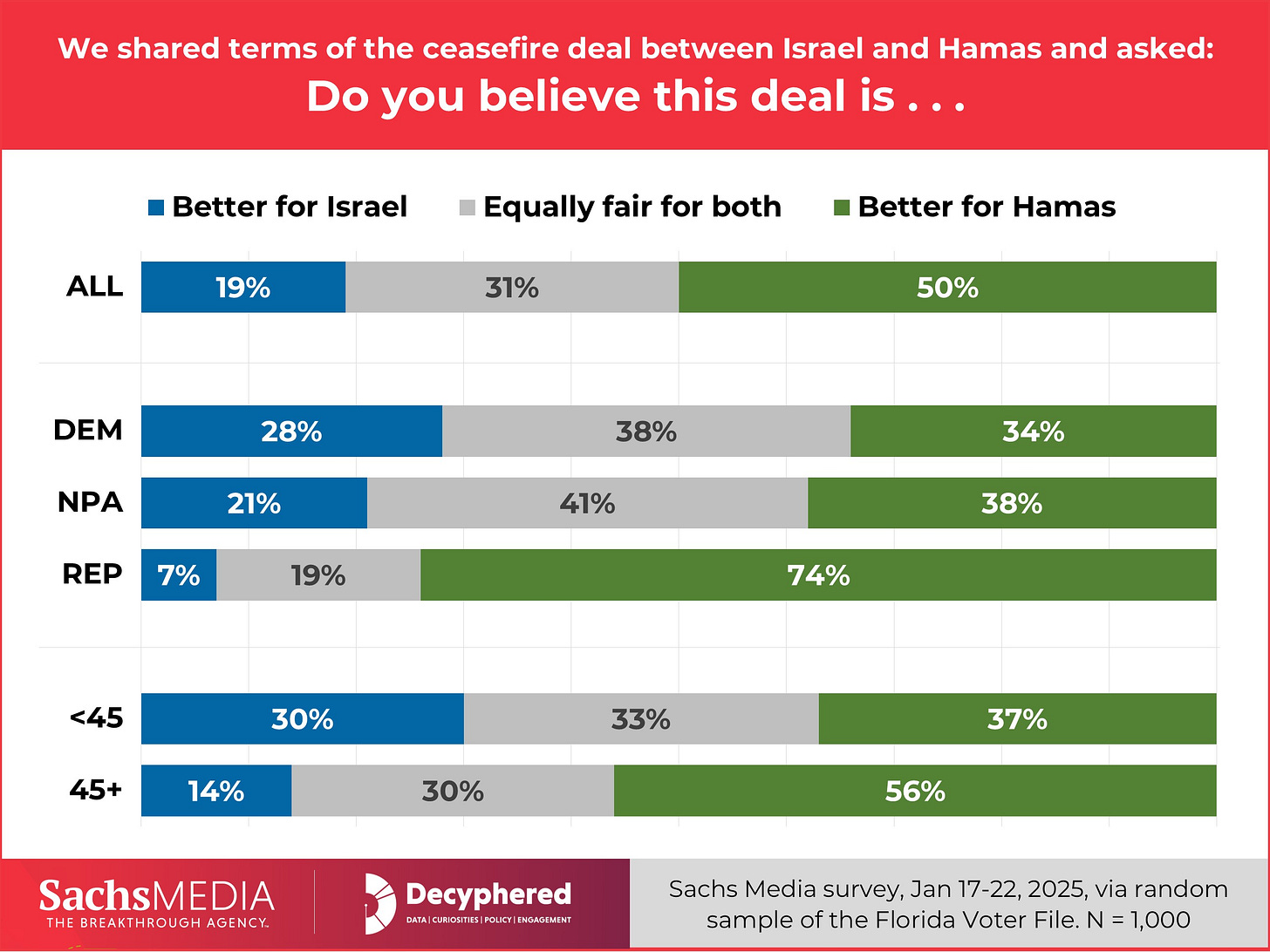
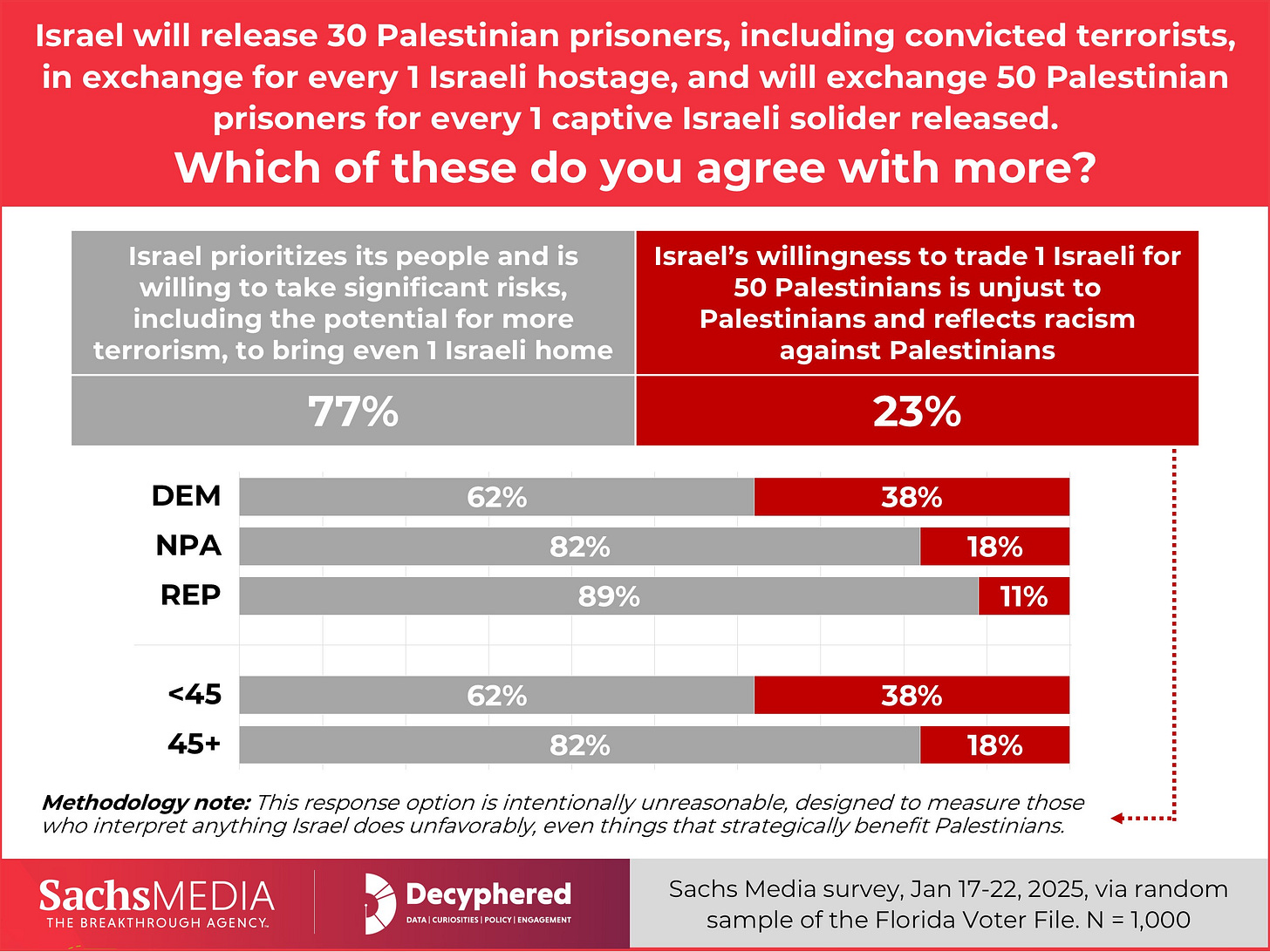
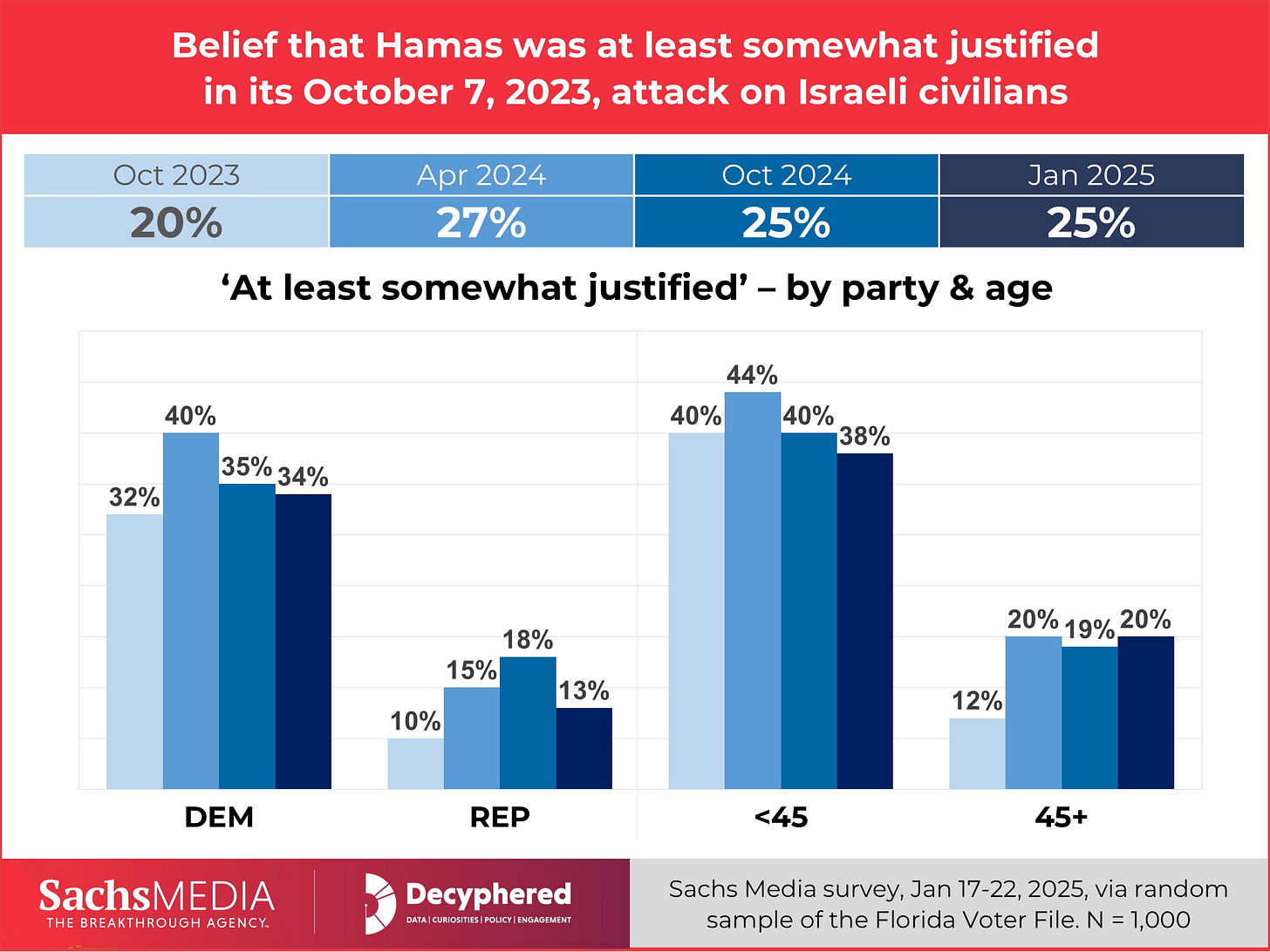
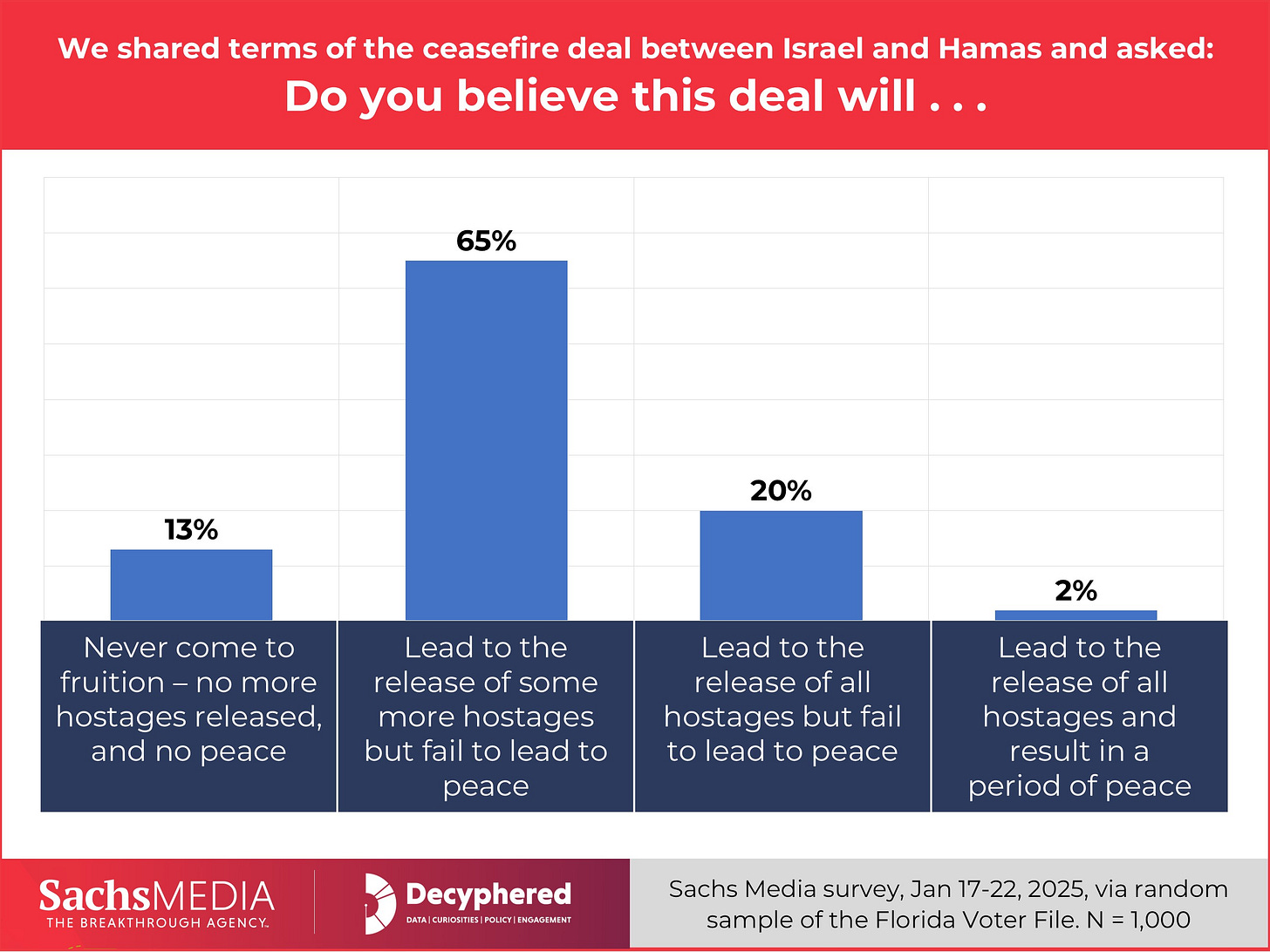
“There’s no pleasing some people!”
“That’s what Jesus said.”
What I find particularly alarming in this data is the growing antisemitism among younger people. Nowhere was this more evident than on college campuses where Jewish students were bullied, harassed, and threatened -- with little support or intervention from administrators.